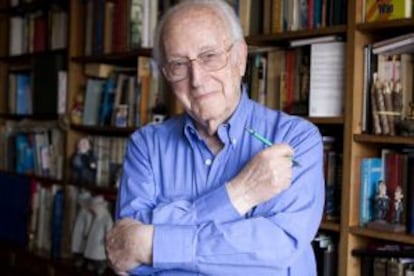Antonio Mingote’s last draw
The cartoonist, humorist and intellectual has died at the age of 93

After more than six decades gently satirizing Spanish life through his drawings and writing, humorist Antonio Mingote died on Tuesday in Madrid at the age of 93.
The immediately recognizable cartoons of Mingote, most of whose career was spent working for the conservative daily Abc, provide a unique insight into Spain under the dictatorship of General Franco — a vision of life anchored in the everyday decency and humor of ordinary people — and also a quiet celebration of the return to normalcy, along with rapid social change, that came with democracy.
In 1987 he was made a member of the Royal Academy of the Spanish Language, just one of many honors bestowed upon him, among them the Order of Isabel the Catholic, the Gold Medal of Merit in Labor, the Quevedos Ibero-American Prize for Graphic Humor, and the Gold Medal of Merit in Fine Arts.
He was even elevated to the nobility last year, when King Juan Carlos conferred upon him the title Marquess of Daroca, after the small village he came from in Aragón.
Mingote showed an interest and ability in expressing himself through humor and drawing early, and was only 13 when he published his first drawing in the children's supplement for Blanco y Negro, the forerunner of Abc.
He had begun training to become an officer in the army, then switched to Philosophy at the University of Zaragoza, but the Civil War interrupted his studies.
In 1946 he became a regular contributor to satirical magazine La Codorniz, one of the few publications to regularly challenge Franco's censors, and which closed in 1978 after Spain returned to democracy.
In 1953 he published his first cartoon in, becoming its best-known contributor, inventing a universe populated by easily scandalized matrons, young men about town, Quixotic gentlemen, mini-skirted young women and mischievous schoolboys.
But Mingote was more than just a cartoonist, and his simple but elegant style was soon in demand by theater directors. He designed the sets and costumes for Ven y ven al Eslava, a racy comedy review that ran in the late 1950s in Madrid's Eslava theater, and which launched the careers of some of Spain's best-loved actors, among them Concha Velasco and Toni Leblanc.
He was also the artistic director for the Goya-nominated 2002 animated film Time Gate and created the costumes and set for the 2004 stage production of Don Mendo's Revenge, an enduringly popular spoof on Spain's Golden Age drama.
Although he published just two novels, 40 years apart, his contribution to Spanish cultural life earned him his place at the Royal Academy of the Spanish Language, becoming the first graphic humorist to be honored with admission to the institution.
By now regarded as a national treasure, Mingote was the recipient of a national tribute in 1995.
In 1999 he suffered a brain hemorrhage, but was soon back at work: a decade later he was still active, taking two years to produce a series of illustrations of a new edition of Cervantes' Don Quixote. In 2006, to celebrate a life devoted to graphic humor, he published a collection of books with a selection of his almost 55,000 published cartoons.
He continued working until the end, producing the poster for José Luis García Sánchez's 2011 film Los muertos no se tocan, nene (We don't touch the dead, child), the final part of a filmed trilogy depicting the vicissitudes of life in Franco's Spain based on the novels of his close friend Rafael Azcona.
Tu suscripción se está usando en otro dispositivo
¿Quieres añadir otro usuario a tu suscripción?
Si continúas leyendo en este dispositivo, no se podrá leer en el otro.
FlechaTu suscripción se está usando en otro dispositivo y solo puedes acceder a EL PAÍS desde un dispositivo a la vez.
Si quieres compartir tu cuenta, cambia tu suscripción a la modalidad Premium, así podrás añadir otro usuario. Cada uno accederá con su propia cuenta de email, lo que os permitirá personalizar vuestra experiencia en EL PAÍS.
En el caso de no saber quién está usando tu cuenta, te recomendamos cambiar tu contraseña aquí.
Si decides continuar compartiendo tu cuenta, este mensaje se mostrará en tu dispositivo y en el de la otra persona que está usando tu cuenta de forma indefinida, afectando a tu experiencia de lectura. Puedes consultar aquí los términos y condiciones de la suscripción digital.







































